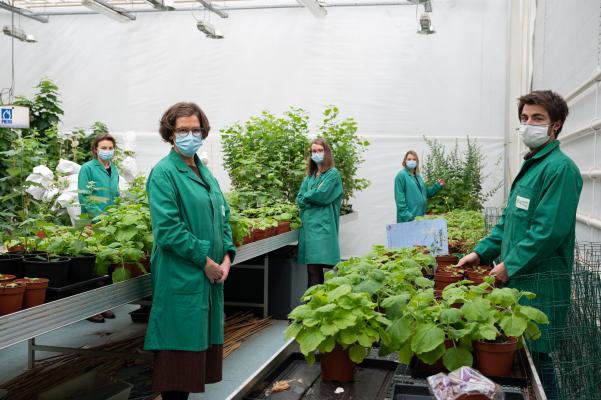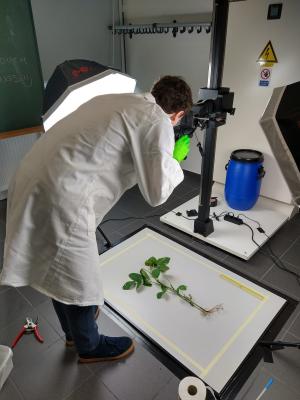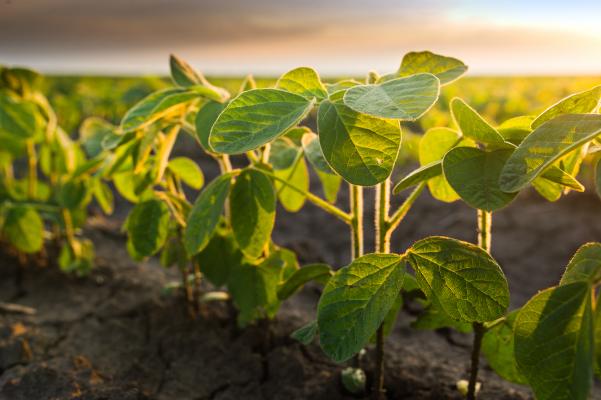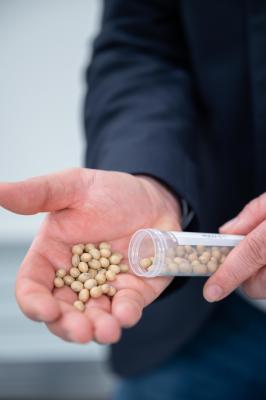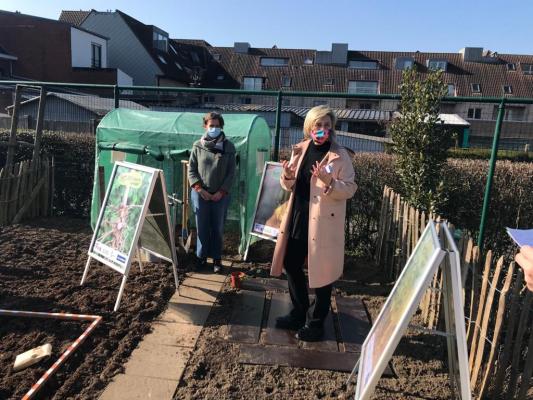Harnessing the microbiome of soil

Harnessing the microbiome of soil
The soil in which we grow our crops contains billions of bacteria, fungi and other microorganisms that are more powerful than you might think. These can devastate our plants – think back to the potato blight that led to the Great Famine – but they also possess the power to strengthen crops, making them more resistant and faster growing. Enter VIB.
Even back in the 80s, researchers worldwide were already gaining insights into growth-stimulating microorganisms. But this field of research has truly flourished only in the past few years, right here in Belgium. Recent technological breakthroughs and tech transfer efforts have led to the foundation of Aphea.Bio and Protealis, two VIB spin-offs that are exploring and developing a new generation of agricultural solutions.
The innovators




From human to plant
Any idea what happens when experts in microbiology and plant science meet? A cross-fertilization that exemplifies the strength of VIB.
The main goal of scientist Jeroen Raes, group leader at the VIB-KU Leuven Center for Microbiology, has always been to better understand the relation between the gut microbiome and human diseases, such as cancer and autoimmune diseases. But recently, the impact of his research has become much broader. He teamed up with Sofie Goormachtig, group leader at the VIB-UGent Center for Plant Systems Biology.
Jan Michiels, group leader at the VIB-KU Leuven Center for Microbiology followed a similar research path: "People suffering from chronic and recurrent infections often harbor pathogenic bacteria with high antibiotic tolerance. We are investigating the mechanisms that help these extremely stress-resistant pathogens to survive antibiotic treatment in order to develop better antibiotics that can kill them. Our findings in the human microbiome help us to do exactly the opposite when it comes to the plant microbiome: we develop highly stress-resistant beneficial bacteria that fix atmospheric nitrogen for the plant. Usually, more than 90% of the bacteria that we apply to seeds die immediately after planting. But if we manage to make these bacteria more stress-resistant, more will be able to survive the harsh conditions and fix nitrogen to the benefit of the plant."
Idealism and curiosity
One of the VIB spin-offs relying on this groundwork is Aphea.Bio. The Ghent-based company focusing on next-gen agro-biologicals is growing very fast, working closely together with Sofie Goormachtig. She is investigating how plant roots interact with neighbouring organisms in our soil. "With the help of VIB's Innovation & Business team, we developed the proof of concept for Aphea.Bio, contributed to the business plan and provided scientific advice," says Goormachtig. "That may seem like a huge stretch for scientists who focus on basic research, but the opposite is true. When starting a VIB spin-off, you’re always surrounded by professionals with complementary skills. In this case, I was happy to see CEO Isabel Vercauteren and CSO Steven Vandenabeele take on the management responsibilities."
Bringing in his experience as research manager at BASF CropDesign, Dr. Vandenabeele joined the team in 2015. "It was my job to build a business case," says the Aphea.Bio CSO. "I examined potential crops, explored the market, mapped out farmers’ demands, etc. Aside from that, I was charged with guiding the proof of concept in order to support this case. In my experience, that was one of this journey’s most challenging endeavors. The second one was fundraising, but that’s where Isabel came in.”
Dr. Vercauteren: “I was R&D licensing and new ventures manager at Bayer CropScience when Sofie and Steven asked me to join their promising project. My first big task, raising the necessary funds, was both challenging and exciting. Our very first pitch hit a few speedbumps, but we soon grew into our roles, finetuned our presentation and learned how to tick all the boxes from an investor’s perspective.
“In the end, we successfully raised EUR 9 million in our first investment round and received the support of Flanders Innovation & Entrepreneurship (VLAIO). A few years later, in 2020, we entered a new phase of fundraising to market the products we developed. The equity investment of the European Circular Bioeconomy Fund (ECBF) brought our capital injection to a total of EUR 18 million. We're now ready to advance our product portfolio towards regulatory approval and a first commercial launch."
Focusing on applications in nutrient stress and diseases, Aphea.Bio's business plan differs slightly from what Sofie and her team originally had in mind. "Basic science and business are two sides of the same coin," acknowledges Goormachtig. "This is especially true at VIB, because we strongly focus on the translational value of research. Scientists tend to be idealistic about the potential applications of their findings, but I still believe that idealism and curiosity are indispensable forces required to push boundaries and generate real societal impact. It’s our job to ask fundamental questions, even if it will take decades to translate the answers into applications."


The power of soybeans
Reducing fertilizer application and controlling fungal diseases sustainably in maize and wheat, Aphea.Bio is not the only spin-off relying on VIB's earlier research to pioneer in the field of sustainable agriculture. Founded in April 2021, Protealis aims to harvest the full potential of legume crops, inspired by the mission to locally grow more sustainable plant-based proteins. The initial focus is to develop high-yield, high-protein soybean varieties using plant growth-promoting bacteria. These innovations build on the work of the VIB labs of Sofie Goormachtig and Jan Michiels, and the ILVO teams of Joke Pannecoucque and Isabel Roldán-Ruiz.
“Legume crops are excellent sources of protein and can be grown sustainably, as they do not require nitrogen fertilization," says Protealis CEO Dr. Benjamin Laga. "With their soil-improving characteristics, legumes are an excellent addition for farmers in crop rotation. Soy, containing up to 46 grams of protein per 100 grams of beans, is a logical first choice of crop for Protealis."
Flanders Research Institute for Agriculture, Fisheries and Food (ILVO) played an important role in the foundation of Protealis. VIB and ILVO have been collaborating since 2016, combining expertise in basic research (VIB) and applied research and fieldwork (ILVO) to study the results in more depth. Thanks to this joining of forces, scientific discoveries can be translated faster into tangible added value for farmers, society and the environment. In this case, Protealis relies on research into yield-enhancing soil bacteria by VIB and breeding technologies developed by ILVO.

The power of people
Another result from the fruitful collaboration between VIB and ILVO is 'Soy in 1000 Gardens', a citizen-driven science project that aims to introduce soy as a crop in Flanders. In early 2021, more than a thousand citizens were recruited to grow and analyze the soy in their own gardens and fields and respond to surveys about its progress. In the summer, their plants were collected for research.
"In a first phase, we want to investigate where beneficial bacteria that enhance the growth of soy are already present in our soil," Dr. Lena Vlaminck, who manages the scientific part of this project, explains. "Later, we want to develop guidelines and applications to boost the yield of soy cultivation in a sustainable way. At the moment, Belgium imports approximately 800,000 tons of soy annually, mainly from South America. Local soy production on a larger scale would also benefit our ecological footprint."


